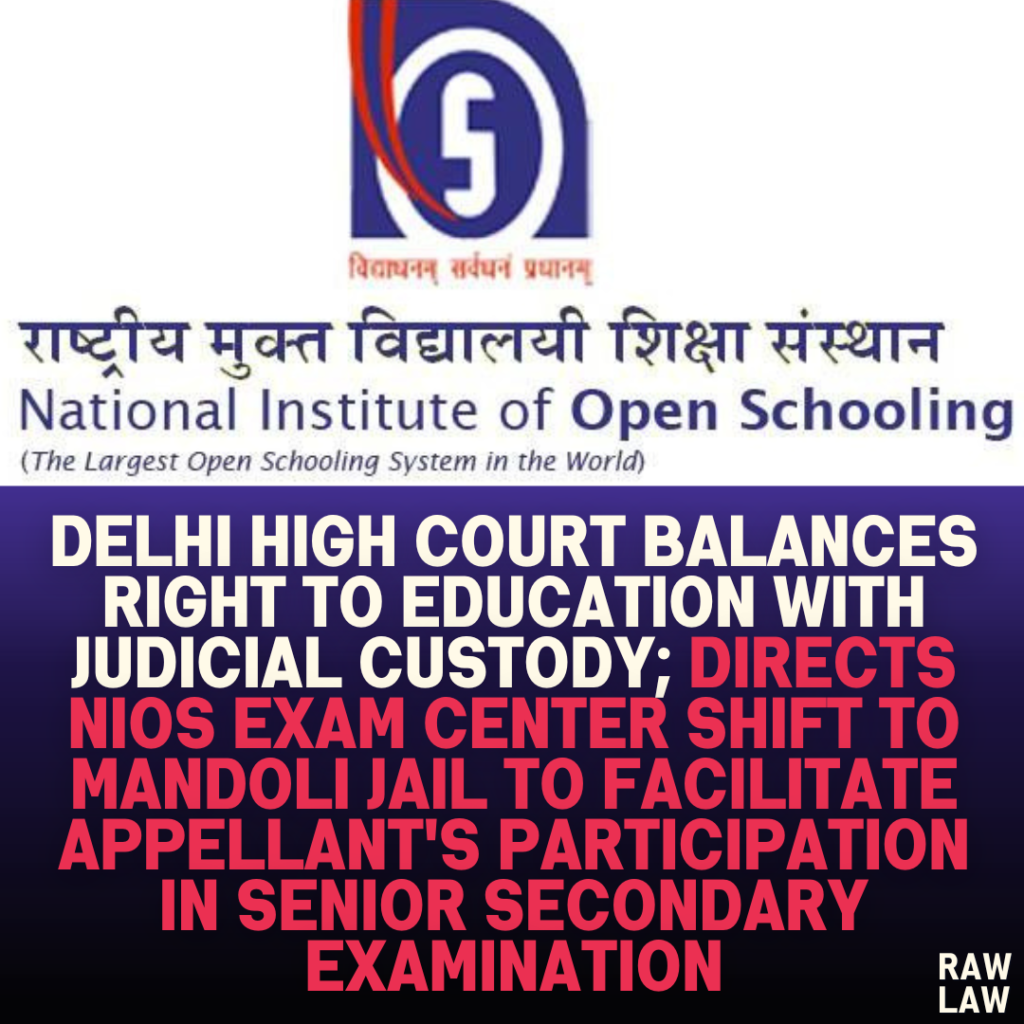Court’s Decision
The Delhi High Court directed that the appellant’s examination center for the National Institute of Open Schooling (NIOS) Senior Secondary theory examination, scheduled from October 29, 2024, be shifted to Mandoli Jail, where an examination center is available. The appellant is required to deposit the necessary fee, though the court ordered the center change to proceed without delay, even if the fee pre-deposit isn’t completed.
Facts
The appellant, currently in judicial custody, sought interim bail to attend his Senior Secondary examination conducted by NIOS. The trial court had earlier rejected his application, citing that a center was available in Mandoli Jail. The appellant’s prior interim bails were granted for humanitarian reasons, including support for family medical needs, and he had adhered to all surrender conditions post-bail.
Issues
The primary issue was whether the appellant should be granted interim bail to participate in the NIOS Senior Secondary examination or whether alternate arrangements could facilitate his examination within the jail premises.
Petitioner’s Arguments
The appellant argued that interim bail should be granted to allow him to attend his examination, stressing that he had previously complied with bail conditions without any misuse of the granted liberty. He highlighted logistical challenges in attending a practical exam under custody, which hindered effective participation.
Respondent’s Arguments
The State opposed the interim bail, asserting that NIOS had confirmed the availability of an examination center in Mandoli Jail. The State contended that changing the appellant’s examination center to the jail would address his needs without necessitating release on interim bail.
Analysis of the Law
The court examined Section 21(4) of the National Investigation Agency Act, 2008, read with Section 43-D(5) of the Unlawful Activities (Prevention) Act, 1967. These provisions govern the stringent criteria for granting bail in cases related to national security and serious crimes, placing significant emphasis on minimizing the chances of flight or misuse of liberty.
Precedent Analysis
The court referenced past orders, where interim bail was granted for urgent humanitarian grounds, including prior educational and family-related support.
Court’s Reasoning
The court emphasized that logistical arrangements within the jail could facilitate the appellant’s examination, thus balancing the appellant’s right to education with judicial caution in cases involving serious charges. The presence of an NIOS center in Mandoli Jail provided a practical solution that did not compromise judicial custody principles.
Conclusion
The appeal was disposed of with directions to NIOS to change the appellant’s examination center to Mandoli Jail and to expedite the necessary arrangements to facilitate his examination. The appellant, or a representative, is required to pay the stipulated fee within one week.
Implications
This decision underscores the court’s approach in reconciling individual rights with custodial limitations, particularly concerning education access for detainees. It reflects a judicial balancing act where in-custody rights are preserved without compromising security concerns.




Pingback: Delhi High Court Dismisses Petition, Emphasizes Dermatological Examination for Tattoo Compliance in Police Recruitment; Affirms Tribunal’s Directive to Assess Functional Fitness under Clause 13.2 of Recruitment Guidelines - Raw Law